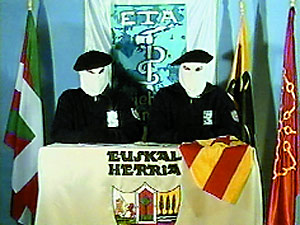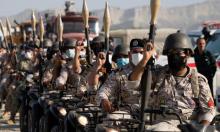Suspected ETA members extradited from Mexico
Six suspected members of the Basque separatist group ETA who had been extradited from Mexico after a long legal battle arrived at a military air base in Spain Friday officials said.

The suspects, five men and one woman, were accompanied off an aircraft which landed at Torrejon air base near Madrid at 8:15 a.m. (0615GMT) by Interpol and Spanish police agents, police said in a statement.
All six are expected to face terrorism charges.
The extradition, sought by Spain , went ahead after Mexico 's Supreme Court last month rejected a final plea by the suspects to avoid being sent to Spain , where the government says they were members of an organization that launched a violent armed campaign for an independent Basque homeland three decades ago.
On 22 March, ETA, whose name is a Basque-language acronym for Basque Homeland and Freedom, announced it was declaring a permanent cease-fire.
The suspects, Asier Arronategui, Ernesto Alberdi, Felix Salustiano Garcia, Juan Carlos Artola, Jose Maria Urquijo and Maria Asuncion Gorrochategui, have repeatedly denied any affiliation with ETA. Most had been living for years in Mexico.
In their injunction presented before the Mexican court they argued that Spain had failed to provide sufficient evidence when it asked Mexico to detain them in July 2003. They have been held in a penitentiary in the capital since then.
High court judges, however, found that there was enough evidence to support the arrests. In several hours of discussion that stretched over two days, judges also weren't persuaded by the claims that ETA suspects face torture in Spanish prisons.
Mexico's attorney general's office said in the months following the original arrests that Spain had provided evidence the six were involved in an ETA cell operated by exiled Basques.
In addition to their suspected membership in ETA, Spain has charged the suspects with laundering money and receiving illicit proceeds from terrorist activities
ETA separatist violence has claimed more than 800 lives since the late 1960s. The group mostly targeted security force members, although in the 1990s it increasingly began to kill politicians. In 1995, in one of its most audacious plots, it tried to assassinate Jose Maria Aznar, then an opposition leader who would go on to become prime minister, reports the AP.
I.L.
Subscribe to Pravda.Ru Telegram channel, Facebook, RSS!




